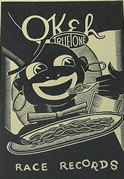From another cultural perspective, the phonograph in the 20th century had an important role in race relations, particularly in the United States. In the early decades of the century, the jazz music being invented at the time by African-Americans began to filter into the mainstream record catalogs, but it was usually recorded and performed by whites. What might be seen as a positive link being formed between black and white society via the sound recording must unfortunately be counterbalanced by the simultaneous phenomenon of “coon” and ethnic recordings. There was a long-running fascination with “coon” record and similar recordings, which were often presented as comedy, and used stereotyped black-sounding voices to entertain in what (as one historian has written) “was intended to be a patronizing but benevolently humorous manner.” It is difficult from today’s perspective to hear these recordings and not be offended, but perhaps whites at the time did not seem them from our perspective. In fact, it is reasonable to compare these to another popular turn-of-the-century type recording which employed humorous stereotypes of whites-known as “hick” recordings. Modern attitudes about rural whites have not undergone the same transition as those regarding African-Americans, so that today the “hick” stereotype is still socially acceptable. It is possible that “coon” recordings reflected an analogous type of attitude among the white population.
